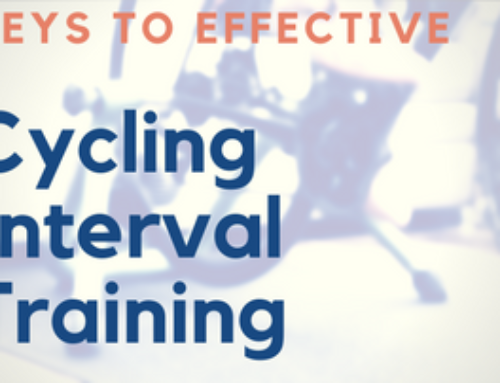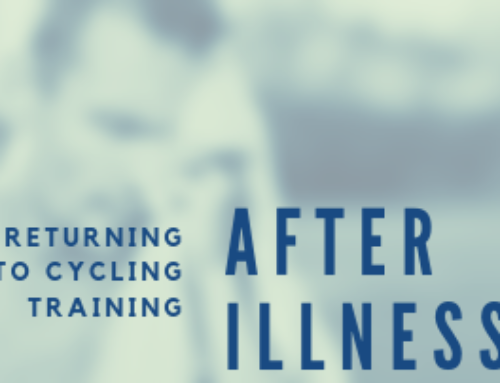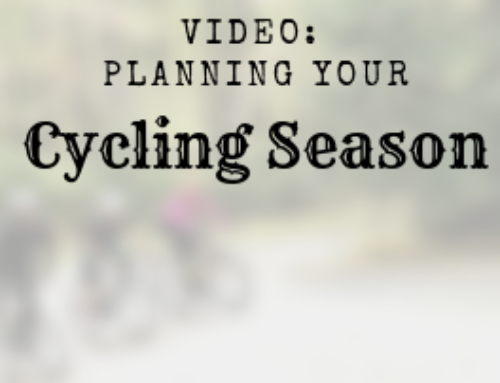Every time summer rolls around, I get a lot of questions about warming up in the heat. People are riding, racing and training in the heat and find their performance suffering. Even though it's hot, you can't skip your warm up, because much of your performance depends on priming your body properly. These tips will help you optimize your performance during a warm weather warm up.
The importance of warming up
Warming up is a key to a high-quality performance. Your body needs time to activate it's “aerobic machinery” before competing. Until you really get the enzymes and pathways going, you'll be running on more anaerobic systems. This means you'll burn matches faster and have less energy available when it counts. By warming up, your body is prepped to produce energy through the electron transport system. It starts oxidizing fats, giving you (nearly) limitless aerobic energy. I'm sure you know from experience that a poor warmup will leave you feeling tired and weak during the beginning of your ride.
So warming up is really important, but what kind of warming up should you do? In “The Pre-Race Warmup” I said the length of time you warm up is dependent upon the activity you're warming up for. The longer the activity, the shorter the warm-up, and visa versa. What I didn't talk about in that article were the factors that temperature and weather play in your warm up.
Check out the tips after the break to stay cool while warming up:
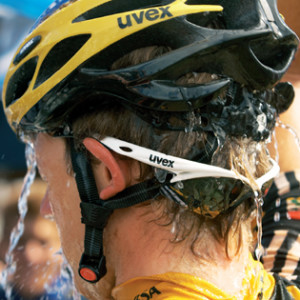 1: Start cool and hydrated before warming up
1: Start cool and hydrated before warming up
Before you begin warming up, you'll want to get your core temperature down as much as possible. The increase in core temperature during exercise can quickly lead to decreased performance, so staying cool is important. That begins before you even start warming up. Keeping your core cool before you warm up will keep your overall core temperature down when you start riding. Essentially if you start cool, you stay cooler for longer. Before you start warming up, hang out in a cool environment such as an air-conditioned car or shady tent. Drink from a bottle of ice cold liquid while you sit in the cool air or the shade. You can even invest in an ice vest if you frequently find yourself unable to find a cool place to relax before your warm up begins.
You'll also want to ensure you're properly hydrated before you start warming up. Electrolytes are critically important here so an electrolyte mix such as Scratch Labs hyper hydration mix is appropriate. The increase in plasma electrolytes will help to increase plasma volume. This sets your body up to perform better, handle heat stress better and cool your body with sweat. Shoot for a solid 18 ounces of electrolyte mix around an hour to an hour and a half prior to warming up.
2: Shorten your warm up in the heat
In my post on the pre-race warm-up, I discussed a couple of different scenarios and specific warm-ups for each one. The important thing to consider when the temperature rises is to moderate the duration of your warm-up. The hotter the weather and/or the longer the event, the shorter the warm-up should be. Even if you have a really short event on tap, if the temperature is scorching, you should shorten your warm up significantly.
As I noted earlier, core temperature is an important consideration when competing in the heat. The longer you warm up, the higher your core temperature will rise to. After all, it is called a “warm” up. The warm-up I provided in my pre-race warm-up post runs about 20 minutes long. If you're racing in high heat (or humidity), I'd recommend cutting your warm up to about half that duration. You can do this by cutting the easy spinning in half and start the ramp to VO2 max at a higher intensity.
You don't want to burn up the engine before you're done warming up, right?
3: Get cool post warm-up
Once you've warmed up and your body has kicked into high gear, get back to a cool or shady place and start to chill down. A bottle of ice cold water poured over your jersey helps to start cooling you through evaporation, while drinking an iced liquid cools you from the inside as well. This two-pronged approach to cooling helps to rapidly decrease your core temperature. And as you recall, increased core temperature can hurt your performance.
By decreasing your core temperature, you're able to delay the onset of heat induced performance loss by a significant amount of time. This can be a tricky proposition, though. If you cool down too much or too long, you'll perform poorly because your body's physiology returns to resting state. If you don't cool down enough, you'll remain hot and performance will suffer as you heat up during your event.
So get cooled down for a few minutes between your warm-up and the start of your event.
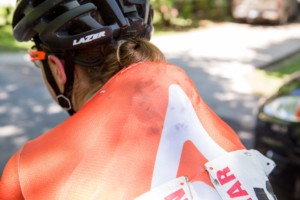 Bonus tips for staying cool during your rides
Bonus tips for staying cool during your rides
The first thing you need to think about is how to manage heat stress while you're out on your bike riding, training, and racing. You'll need to ensure you don't overheat while riding. If you do, your performance will suffer at best, and you'll suffer from heat-related illness at worst. Either of those would put a serious cramp in your plans.
You can check out some of my tips on beating the heat in this post. On top of those tips, I've got another trick up my jersey sleeve to keep you cool in the summer heat.
Use an ice sock
This trick is something I learned a couple years ago from a couple pro racers. Having tried it a number of times, I can tell you that it works awesomely. You'll have to head over to your local supermarket (or pharmacy, or whatever) and pick up a pair of pantyhose. I know it sounds weird, but hear me out. You snip off one leg of the pantyhose and fill it with ice and tie it off. Then, you tuck it into the back of your jersey so that as you ride, the ice will melt and that ice cold water will drip down your back, cooling you and soaking your jersey. Soaking your jersey will help assist with evaporative cooling as well as keeping you cool via conductive cooling.
The only thing you may have some trouble with is anchoring the stocking. If you're wearing a properly fitting kit, it should stay in place on your upper back. If your jersey is a little loose, you can always safety pin it to the collar of your jersey to keep it in place while you ride.
It's important for me to say that you never want to put ice on bare skin. Doing so puts you at the risk of frostbite, especially when you're leaving it there for an extended amount of time like an ice sock would be.
Now that you have a couple of hot tips to keep you cool, warming up in the heat should be a breeze.


